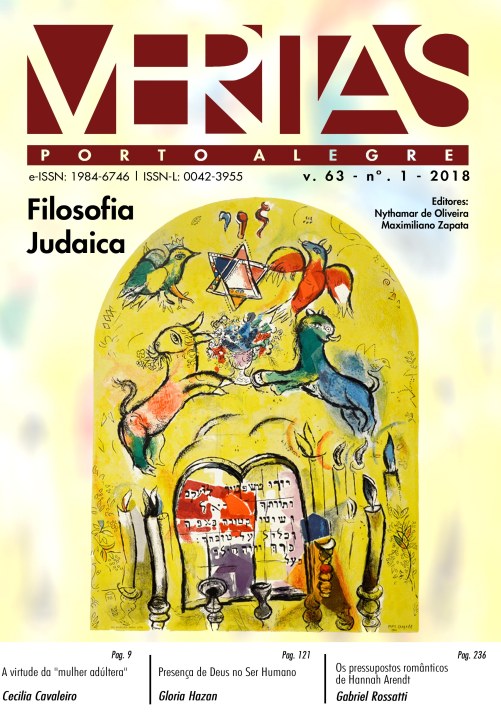The virtue of the “adulterous woman”: Ibn Gabirol on the dignity of matter
DOI:
https://doi.org/10.15448/1984-6746.2018.1.29653Keywords:
Ibn Gabirol, matter, unity, multiplicity, continuity.Abstract
We could say that the predominance of form over matter – ontologically, hierarchically and in dignity – is almost unanimous in medieval thought. Most of the medieval proposals of combining philosophy and religion present matter as bastard (since its origin is rarely clarified), as the source of imperfection, deprivation and failure, and sometimes it was directly related to evil and sin. The image of matter as a sinful woman was used by Ibn Sina and it was taken over by Maimonides, that compared it to the adulterous woman who, despite being married with a form, is constantly moving, looking for another form to replace the first one. For the particularities of his doctrine, Ibn Gabirol never had problems when discussing this issue, including the origin of matter – theme that is avoided by most philosophers – but not without being strongly criticised by contemporary readers and throughout history, who accused him of contradiction. By particularities of his doctrine I mean: 1) matter is not body; 2) intelligible matter is not essentially different from sensible matter; 3) matter is not the source of diversity and multiplicity; 4) matter comes directly from God’s essence. So, even if Ibn Gabirol kept the qualities that were understood by other philosophers as the volatile nature of this woman – or the fact that she is always able of receiving many forms – there is nothing that discredit her character.Downloads
References
ARISTÓTELES, Metafísica. Trad. Marcelo Perine da versão italiana de Giovanni Reale. São Paulo, Loyola, 2001.
AVENCEBROLIS (Ibn Gabirol) Fons Vitae, ex Arabico in Latinum translatum ab Iohanne Hispano et Dominico Gundissalino; ex codicis Parisinis, Amploniano, Columbino primum edidit Clemens Baeumker, Münster: Aschendorff, 1895.
FACKENHEIM, Emil L. (transl.). “A Treatise on Love by Ibn Sina”. Mediaeval Studies 7 (1) p. 208-228 (1945). DOI: https://doi.org/10.1484/J.MS.2.305873
MAIMONIDES, Guide for the Perplexed, Translated from the original Arabic text by M. Friedlander. 2nd. Edition. New York: Dover Publications, 1956.
PINES, Shlomo. "Fragments of the Arabic Original of Fons Vitae in Moses Ibn Ezra's Work 'Arugat Habbosem" (Hebrew). Tarbiz, 27 (1957/58), p. 218-33.
Downloads
Published
How to Cite
Issue
Section
License
Copyright
The submission of originals to Revista Veritas implies the transfer by the authors of the right for publication. Authors retain copyright and grant the journal right of first publication. If the authors wish to include the same data into another publication, they must cite Revista Veritas as the site of original publication.
Creative Commons License
Except where otherwise specified, material published in this journal is licensed under a Creative Commons Attribution 4.0 International license, which allows unrestricted use, distribution and reproduction in any medium, provided the original publication is correctly cited. Copyright: © 2006-2020 EDIPUCRS</p






